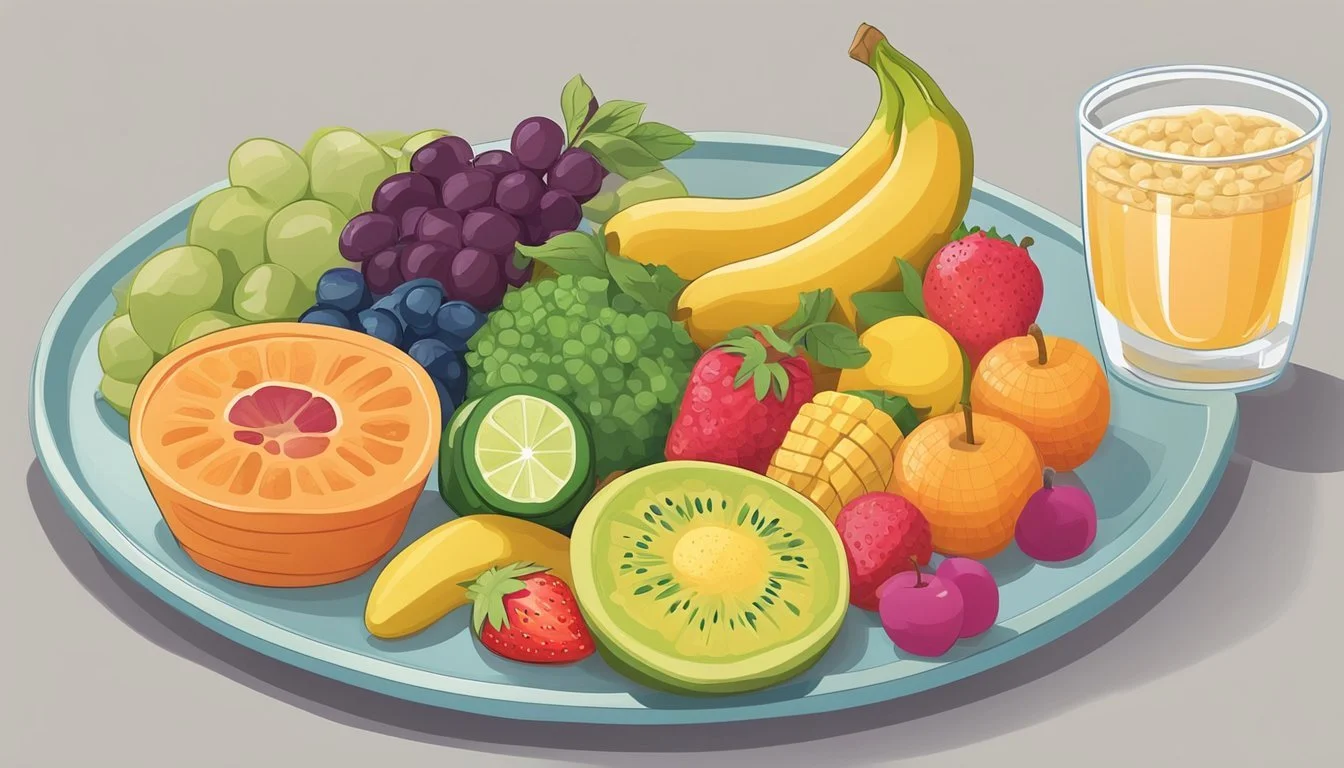Kid-Friendly Foods to Ease Constipation in Your 3-Year-Old
Constipation is a common issue for young children, often leading to discomfort and frustration for both the child and the caregiver. It can be caused by a variety of factors, including diet, hydration levels, and physical activity. Parents frequently seek ways to alleviate this problem through dietary adjustments and natural remedies.
Incorporating specific foods into a toddler's diet can be an effective way to promote regular bowel movements. These foods are typically rich in fiber, which helps to soften stools and stimulate bowel activity. Understanding which foods are most effective in addressing constipation can provide much-needed relief for children and peace of mind for their parents.
1) Prune Juice
Prune juice is a natural remedy frequently used to alleviate constipation in young children. It contains a high amount of sorbitol, a sugar alcohol that has a mild laxative effect.
Administering prune juice to a three-year-old can be an effective way to encourage regular bowel movements. The typical recommendation is to use a maximum daily dose of 4 ounces.
Sorbitol helps to draw water into the intestines, which can soften the stool and make it easier to pass. This process makes prune juice a gentle and non-invasive option for treating constipation.
Parents should ensure to give prune juice no more than twice a day. Regular and controlled usage can help prevent excessive bowel movements or discomfort.
In addition to its laxative properties, prune juice is also rich in vitamins and minerals, which can support a child's overall health.
2) Oatmeal
Oatmeal is an excellent food to help a 3-year-old with constipation. It is rich in soluble fiber, which can help the digestive system function smoothly.
Preparing oatmeal is simple and quick. Instant oatmeal contains about 4 grams of fiber per serving, making it a practical choice for busy parents.
Mixing oatmeal with fruits like apples, pears, or prunes can increase its effectiveness. These fruits add additional fiber and natural sweetness, making the meal more appealing to young children.
Serving oatmeal regularly, especially during breakfast, can be an effective way to keep your child’s bowel movements regular. It not only aids digestion but also provides essential nutrients like iron and B vitamins.
Oatmeal can be introduced in various forms, such as cooked oats, oatmeal bars, or oatmeal cookies. This variety helps in keeping the toddler interested and willing to eat it.
3) Pumpkin Puree
Pumpkin puree is a great option for helping a three-year-old with constipation. Rich in fiber and essential nutrients, this soft-textured vegetable aids digestion and makes bowel movements easier.
Pumpkins contain both soluble and insoluble fiber, which can help maintain healthy digestion. Soluble fiber absorbs water and helps soften the stool, while insoluble fiber adds bulk.
It's easy to prepare pumpkin puree at home. Simply steam or boil pumpkin pieces until soft and then blend them into a smooth puree. This natural remedy is gentle on a toddler's stomach.
In addition to aiding digestion, pumpkin puree is also nutritious. It provides vitamins A and C, which support overall health. This makes it a well-rounded choice for a toddler's diet.
Incorporating pumpkin puree into meals can be fun and versatile. It can be added to soups, mixed with other purees, or even used as a topping for yogurt. This variety ensures that toddlers enjoy their meals while benefiting from its digestive health properties.
Understanding Toddler Digestion
Understanding how a toddler's digestive system works and recognizing common causes of constipation can help provide effective remedies. Digestion in toddlers involves several key stages and can be influenced by various factors that may lead to irregular bowel movements.
How the Digestive System Works in Young Children
A toddler's digestive system is similar to that of adults but is still developing. Food travels from the mouth, down the esophagus, and into the stomach, where digestive enzymes break it down. The nutrients are absorbed in the small intestine, while the large intestine absorbs water and forms the stool.
Children have a shorter digestive tract, which means food moves more quickly through their system. However, their bodies are still learning to regulate digestion. The role of fiber is crucial; it adds bulk to the stool and aids in smoother bowel movements. Ensuring toddlers consume enough fluids is also vital, as hydration helps soften the stool.
Common Causes of Constipation in Toddlers
Several factors can contribute to constipation in toddlers. Dietary changes are a significant cause; a lack of fiber-rich foods like fruits, vegetables, and whole grains can lead to hard stools. Dehydration is another common cause; insufficient fluid intake results in drier, harder stools.
In addition to diet and hydration, toilet habits play a role. Toddlers may ignore the urge to go to the bathroom due to distractions or discomfort, leading to stool buildup and constipation. Stress and changes in routine, such as starting daycare or transitioning from diapers, can also impact their regularity.
By understanding these factors, parents can better manage and prevent constipation, ensuring their toddlers maintain healthy digestive systems.
Dietary Adjustments to Promote Regularity
A balanced diet essential for improving your 3-year-old's digestive health. Key factors include incorporating more fiber-rich foods, maintaining proper hydration, and balancing macronutrients.
Incorporating Fiber-Rich Foods
Fiber plays a significant role in promoting healthy bowel movements. For a child around three years old, aim for at least 8 grams of fiber daily.
Introduce fruits like apples (with skin), pears, and berries. Include vegetables such as broccoli, carrots, and peas. Whole grains like oatmeal, brown rice, and fiber-rich cereals are excellent choices. Barley and lentils can be added to soups or salads.
Replace white bread with high-fiber bread. Beans, including black beans, can be mixed into various meals seamlessly. Ground flaxseed can be sprinkled on yogurt or cereal.
The Role of Hydration in Digestion
Proper hydration aids in preventing constipation by helping to soften stool. Ensure that your child drinks enough fluids throughout the day.
Water should be the primary source of hydration. Milk and diluted fruit juices (like prune juice) can also be beneficial. Avoid excessive sugary drinks as they can exacerbate constipation.
Introduce water-rich foods such as cucumbers, tomatoes, and watermelon. Keeping a water bottle handy can encourage regular drinking habits.
Balancing Macronutrients
A balanced diet composed of carbohydrates, proteins, and fats is fundamental for digestive health.
Carbohydrates: Prioritize complex carbs such as whole grains over simple sugars.
Proteins: Lean meats, eggs, and legumes provide essential nutrients without burdening the digestive system.
Fats: Healthy fats from sources like avocados, olive oil, and nuts should be included moderately. Avoid excessive processed and greasy foods that can hinder digestion.
Maintaining a balanced intake of all three macronutrients ensures smoother digestion and regular bowel movements.
Lifestyle and Routine Changes
Introducing lifestyle and routine changes can significantly help with constipation in three-year-olds. These changes focus on promoting physical activity, establishing regular meal times, and ensuring a comfortable bathroom environment.
Encouraging Physical Activity
Physical activity plays a crucial role in improving digestion and preventing constipation. Ensure that the child engages in activities such as playing outside, running, or even participating in simple indoor games.
Examples of physical activities:
Playing tag or hide-and-seek
Riding a tricycle
Dancing to music
Such activities stimulate the muscles in the intestines, aiding in smoother bowel movements. Encouraging a mix of both structured play (like sports) and unstructured play (like free play) ensures that the child remains active throughout the day.
Establishing Regular Meal Times
Routine is vital for young children, not just for their overall well-being but also for their digestive health. Setting specific times for meals and snacks can help regulate their bowel movements.
Tips for establishing meal times:
Serve three main meals and two snacks at the same times every day
Avoid skipping meals
Gradually introduce fiber-rich foods like fruits, vegetables, and whole grains during these meals
By creating a consistent schedule, the child’s digestive system can develop a predictable rhythm, which helps in easier bowel movements.
Creating a Comfortable Bathroom Environment
A comfortable bathroom environment encourages the child to willingly use the toilet. Make sure the bathroom is child-friendly and stress-free.
Key points to consider:
Use a potty chair or a child-sized toilet seat
Ensure the child's feet are supported (use a stool if necessary)
Maintain a positive and patient demeanor during bathroom times
Having a designated and comfortable spot for toileting can alleviate any fears or anxieties the child may have, making it easier for them to relax and have a bowel movement.





